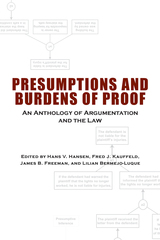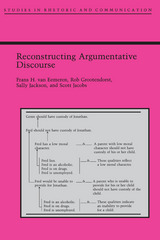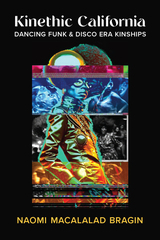2 books by Van Eemeren, Frans

Presumptions and Burdens of Proof
An Anthology of Argumentation and the Law
Edited by Hans V. Hansen, Fred J. Kauffeld, James B. Freeman, and Lilian Bermejo-Luque
University of Alabama Press, 2019
An anthology of the most important historical sources, classical and modern, on the subjects of presumptions and burdens of proof
In the last fifty years, the study of argumentation has become one of the most exciting intellectual crossroads in the modern academy. Two of the most central concepts of argumentation theory are presumptions and burdens of proof. Their functions have been explicitly recognized in legal theory since the middle ages, but their pervasive presence in all forms of argumentation and in inquiries beyond the law—including politics, science, religion, philosophy, and interpersonal communication—have been the object of study since the nineteenth century.
However, the documents and essays central to any discussion of presumptions and burdens of proof as devices of argumentation are scattered across a variety of remote sources in rhetoric, law, and philosophy. Presumptions and Burdens of Proof: An Anthology of Argumentation and the Law brings together for the first time key texts relating to the history of the theory of presumptions along with contemporary studies that identify and give insight into the issues facing students and scholars today.
The collection’s first half contains historical sources and begins with excerpts from Aristotle’s Topics and goes on to include the locus classicus chapter from Bishop Whately’s crucial Elements of Rhetoric as well as later reactions to Whately’s views. The second half of the collection contains contemporary essays by contributors from the fields of law, philosophy, rhetoric, and argumentation and communication theory. These essays explore contemporary understandings of presumptions and burdens of proof and their role in numerous contexts today. This anthology is the definitive resource on the subject of these crucial rhetorical modes and will be a vital resource to all scholars of communication and rhetoric, as well as legal scholars and practicing jurists.
In the last fifty years, the study of argumentation has become one of the most exciting intellectual crossroads in the modern academy. Two of the most central concepts of argumentation theory are presumptions and burdens of proof. Their functions have been explicitly recognized in legal theory since the middle ages, but their pervasive presence in all forms of argumentation and in inquiries beyond the law—including politics, science, religion, philosophy, and interpersonal communication—have been the object of study since the nineteenth century.
However, the documents and essays central to any discussion of presumptions and burdens of proof as devices of argumentation are scattered across a variety of remote sources in rhetoric, law, and philosophy. Presumptions and Burdens of Proof: An Anthology of Argumentation and the Law brings together for the first time key texts relating to the history of the theory of presumptions along with contemporary studies that identify and give insight into the issues facing students and scholars today.
The collection’s first half contains historical sources and begins with excerpts from Aristotle’s Topics and goes on to include the locus classicus chapter from Bishop Whately’s crucial Elements of Rhetoric as well as later reactions to Whately’s views. The second half of the collection contains contemporary essays by contributors from the fields of law, philosophy, rhetoric, and argumentation and communication theory. These essays explore contemporary understandings of presumptions and burdens of proof and their role in numerous contexts today. This anthology is the definitive resource on the subject of these crucial rhetorical modes and will be a vital resource to all scholars of communication and rhetoric, as well as legal scholars and practicing jurists.
[more]

Reconstructing Argumentative Discourse
Frans Van Eemeren
University of Alabama Press, 1993
Reconstructing Argumentative Discourse analyzes argumentation in ordinary disputes. The analysis begins with an ideal model: a theoretical structure of discourse that might be used to resolve a dispute about the merits of two opposing cases. The ideal model does not describe actual argumentative practice. Argumentative discourse does not always seek genuine resolution and, when it does, the participants may not perform as ideal arguers.
A central challenge for argumentation theory is to give an account of argumentation occurring under less-than-ideal conditions and conducted by less-than-ideal participants. The authors offer detailed analysis of argument in such contexts as ordinary conversation, third party dispute mediation, and religious confrontation. An adequate analytic approach to such forms of discourse, the authors argue, must offer critical insight into actual practice; must begin with a defensible normative standard against which practice can be compared; and must also offer an applicable analytic machinery for making the comparison, so its methods can be tailored to empirical circumstances.
The authors position their study of argumentation within a general “normative pragmatics” characterized by a dual commitment to usefulness and adequacy in description. A distinctive set of practical applications and a distinctive view of practicality follow from this approach, characterized not by the search for generalizable means-end relationships but by the development and testing of plans for making real argumentation look as much as possible like ideal argumentation.
This book integrates for the first time the normative interest of dialectical theories of argumentation with the descriptive interests of the empirical study of everyday language use. This ambitious project is achieved by adopting a distinctively social and pragmatic view of argumentation—by seeing argumentation as a language activity structured for the function of resolving disagreements. The authors examine argumentation in a wide variety of contexts—including everyday conversation, campus evangelism, political speeches, newspaper letters to the editor, and the formal mediation of disputes. In doing so, they illustrate how to analyze the details of actual argumentation and tackle a variety of theoretical and methodological puzzles encountered in the effort to apply normative models to real life argumentation.
[more]
READERS
Browse our collection.
PUBLISHERS
See BiblioVault's publisher services.
STUDENT SERVICES
Files for college accessibility offices.
UChicago Accessibility Resources
home | accessibility | search | about | contact us
BiblioVault ® 2001 - 2024
The University of Chicago Press









